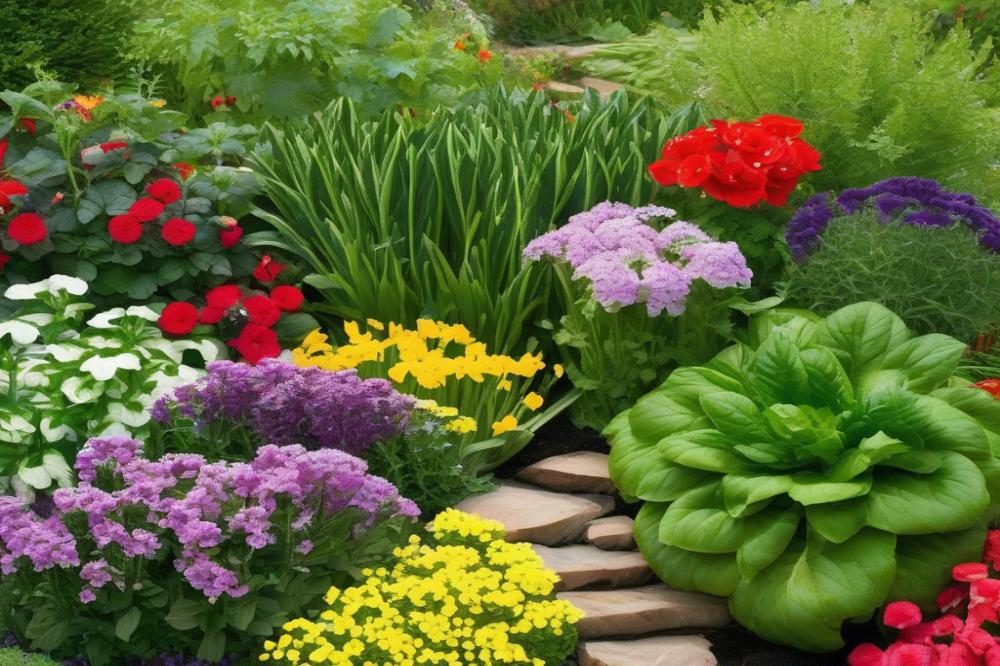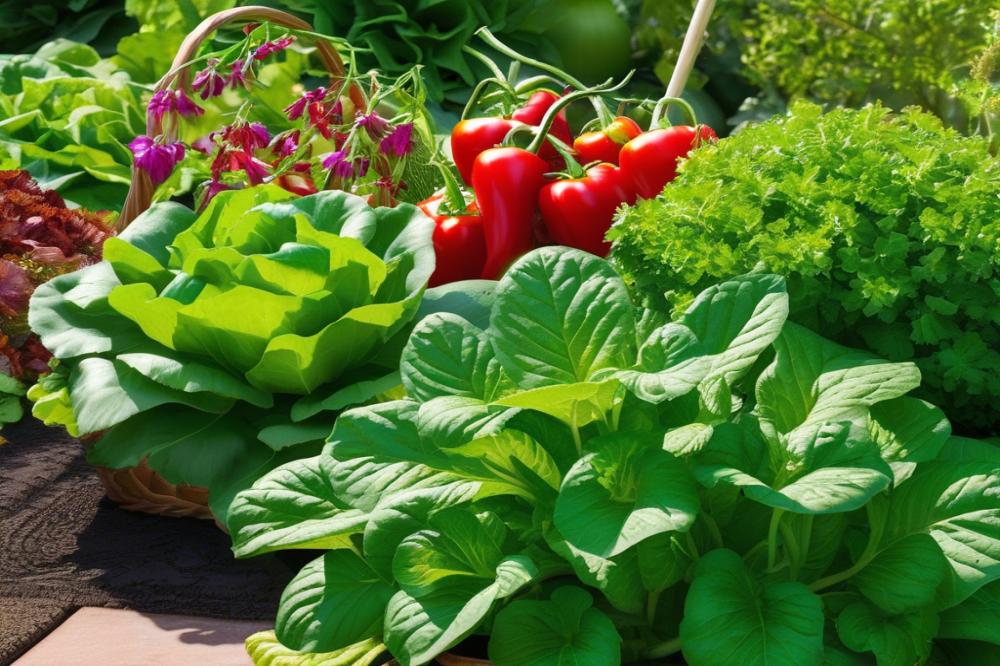The Best Vegetables for natural pest control in Your Garden
Gardening is a fulfilling hobby, but it often comes with challenges. Pests can wreak havoc on your plants, making it crucial to find effective solutions. natural pest control offers a safer way to keep your garden thriving without harsh chemicals. This method not only protects your plants but also promotes a healthy ecosystem.
Utilizing vegetables as a part of pest management is surprisingly effective. For instance, companion planting is a strategy many gardeners use. By placing certain plants near each other, you can naturally deter pests. garlic has a strong scent that many insects find unappealing. When you plant garlic near your favorite vegetables, it can help keep them safe.
Additionally, marigold flowers are well-known for their pest-repelling properties. These vibrant blooms not only beautify your garden but also create a barrier against harmful insects. Pairing them with basil can be especially beneficial. Basil not only adds flavor to your meals but also acts as a trap crop, drawing pests away from more vulnerable plants.
Other effective pest-repelling vegetables include cilantro and onion. Cilantro’s strong scent can help repel aphids and other unwanted bugs. Onions offer similar benefits. Rosemary, chives, and peppermint also contribute to a bug-free garden. These herbs release aromas that pests dislike, making your garden less inviting to them.
Let’s not forget about tomatoes. These juicy fruits attract many beneficial insects. When planted alongside the right companions, tomatoes can create a balanced environment in your garden. A mix of these pest-repelling vegetables can greatly enhance your gardening experience.
In conclusion, using vegetables for pest management is a smart choice. Not only do they protect your crops, but they also support a diverse ecosystem. Embracing natural methods will leave your garden flourishing and enjoyable for years to come.
Understanding companion planting


Companion planting is a gardening technique where different plants are grown close together to benefit each other. This method promotes natural pest control by creating an environment that deters harmful insects while attracting beneficial ones. For example, some plants naturally repel pests that would normally harm their neighbors.
Take marigolds, for instance. These bright flowers are known for keeping nematodes and aphids away from vegetable crops. When you plant marigold alongside tomatoes, you’re giving that tomato plant a protective shield from unwanted pests.
Basil is another excellent companion for tomatoes. Not only does it enhance the flavor of your tomatoes, but it also acts as a pest repellent. Growing basil near your tomato plants can keep the pesky tomato hornworm at bay.
Garlic can be a fierce defender in your garden. Sowing garlic around cabbage and other cruciferous vegetables can repel cabbage moths. It’s a simple way to fortify your garden against invasion.
Rosemary and chives are great allies for many garden plants. They help keep aphids away, providing protection while enhancing the overall flavor of your crops. Planting these herbs nearby can make a big difference.
Think about cilantro for a moment. This herb works wonders when planted next to carrots. It attracts beneficial insects like ladybugs, which will feast on pesky aphids. Your carrot plants will thrive because of this partnership.
Peppermint is another powerful companion. It can deter aphids, whiteflies, and even certain types of moths. Its strong scent masks the signals that attract these pests, giving your vegetables a better chance to flourish.
Each plant has its strengths, and when paired wisely, they can coexist harmoniously. Engaging in companion planting not only enhances your garden’s health but also makes gardening more enjoyable. So why not start pairing these plants in your plot? It’s a straightforward strategy with great benefits.
Top Vegetables for Natural Pest Control


Garlic: Repelling Pests and Enhancing Flavors
Garlic is not just a kitchen staple; it’s a powerful ally in your garden. Its strong scent deters pests like aphids and mosquitoes. Planting garlic around your vegetable beds can help keep those unwanted guests away. Additionally, it enhances the flavor of tomatoes and other crops. Incorporating garlic into your garden benefits both your plants and your culinary creations.
Onion: Natural Deterrent for Many Garden Pests
Onions are another great choice for pest control. Their pungent aroma acts as a barrier to many garden invaders. This vegetable is easy to grow and pairs well with nearly everything. Plant a few alongside carrots or peppers, and watch those pests move away. Enjoy a garden that thrives and stays protected.
Basil: Protects Tomatoes and Other Vegetables
Basil is not only beloved for its taste but also for its protective qualities. When planted near tomatoes, it helps ward off hornworms and whiteflies. The delightful scent of basil attracts pollinators, which is a bonus. Adding this fragrant herb to your garden can lead to a healthier crop and a bountiful harvest.
Cilantro: Attracts Beneficial Insects
Cilantro is perfect for attracting beneficial insects like ladybugs and lacewings. These insects are the champions of pest control in any garden. By planting cilantro, you encourage a natural balance that keeps harmful pests at bay. It also serves as a tasty addition to many dishes, making it a win-win for your garden.
Tomato: Companion Benefits with Marigold
Tomatoes thrive alongside marigolds in a technique known as companion planting. Marigolds repel nematodes and other harmful pests, protecting your precious tomatoes. This duo creates a vibrant and productive garden plot. With the colorful marigolds by your side, your tomato plants will flourish like never before.
Additional Notes
Consider adding chives and rosemary as well. Chives deter aphids, while the scent of rosemary can confuse a variety of pests, driving them away. Peppermint works similarly, adding both fragrance and a pest-repellent action. Together, these plants create a garden ecosystem that promotes growth while minimizing the need for chemicals. Your garden deserves all the natural support it can get!
Herbs That Aid in Pest Control


Chives are more than just a tasty garnish; they play a vital role in strengthening plant defenses. When planted alongside tomatoes, these green wonders can ward off harmful insects that might attack your precious crops. Their strong scent is not just for show; it’s an effective barrier against pests.
Rosemary’s fragrant aroma works magic in the garden. This herb is not just useful in the kitchen; its scent keeps many pests at bay. Consider companion planting it with basil and marigold to amplify its protective properties. Together, they create an environment less appealing to unwanted visitors.
Peppermint adds a refreshing twist to your dishes and functions as a powerful repellent against insects. Its strong smell can confuse and distract many pests, preventing them from finding your other plants. Pairing peppermint with garlic and onion in your garden will create an even more challenging environment for those little nuisances.
Each of these herbs brings unique benefits. Integrating them into your garden not only helps protect other vegetables but also enhances your cooking. Imagine snipping fresh chives for your salad or adding rosemary to your roasted veggies, all while keeping pests in check!
Experimenting with these herbs is a smart strategy for both health and taste. Don’t forget that cilantro also contributes positively to your garden’s ecosystem. It can attract beneficial insects, offering additional support for your crops.
Flowers for Natural Pest Control


Marigold: Attracting Beneficial Insects and Deterring Nematodes
Marigolds are an excellent choice for your garden. These bright flowers are not only beautiful, but they also play a vital role in pest management. Their scent naturally repels nematodes, which can harm vegetable roots. By planting marigolds alongside crops like tomatoes, you can help protect them from these pesky invaders. Moreover, the presence of marigolds attracts beneficial insects like ladybugs and lacewings. These insects eat aphids and caterpillars, creating a healthier environment for your garden.
Planting marigolds is a simple yet effective strategy. It enhances the garden’s overall ecology while adding a splash of color. Try to position them around your vegetable plants. Companion planting these flowers works wonders. They will have a synergistic effect on your garden.
Integrating Flowers with Vegetables for a Pest-Resistant Garden
Creating a garden that deserves attention requires careful planning. Combining flowers and vegetables optimizes pest control. For instance, growing basil near tomatoes can boost their flavor while repelling insects. Garlic is another great ally. Not only does it repel pests but it also adds zest to your meals.
Cilantro and rosemary can also complement this effort. Planting cilantro will attract beneficial insects while rosemary keeps harmful pests away. Chives, with their onion-like flavor, also deter many unwanted guests. Don’t forget peppermint! Its strong scent can confuse pest navigation, reducing their likelihood of infestation.
Integrating these flowers and herbs encourages a diverse ecosystem. It fosters a healthy balance that benefits both plants and gardeners. So, use flowers like marigolds and herbs like basil thoughtfully. Together, they create a garden that thrives while staying pest-resistant. Happy gardening!
Implementing Natural Pest Control Strategies
Creating a balanced garden ecosystem requires careful planning. Companion planting is one of the most effective methods. Growing certain plants together can deter pests while promoting healthier growth. For instance, plant garlic near tomatoes to repel spider mites and aphids. This simple step can significantly reduce pest populations.
Tips for Companion Planting
Consider the virtues of marigold. These bright flowers not only beautify your garden but also ward off nematodes and other pests. Pairing basil with tomatoes is another smart move. Basil’s strong aroma can confuse and repel harmful insects. Don’t overlook cilantro; it attracts beneficial insects like ladybugs. This can help control aphid populations naturally.
Timing and Placement
Placement matters in companion planting. Position taller plants, like tomatoes, away from smaller herbs to avoid shading them. Timing your planting is equally crucial. Make sure to plant marigolds a few weeks before your main crops to maximize their pest-repelling effects. Observing the seasons will help you align planting schedules effectively.
Maintenance and Monitoring
Regular maintenance is vital for pest control effectiveness. Keep an eye on plants and look for any signs of damage. Inspect leaves regularly for pests or diseases. When you notice a problem, it’s better to act quickly. Consider adding onion and rosemary to your garden. Both can act as natural repellents. Chives can deter aphids as well, thanks to their strong scent.
Always be mindful of your plants’ health. Monitor moisture levels to prevent stress, which can attract unwanted pests. Plant peppermint to create a refreshing aroma and deter a variety of insects. By using these strategies, your garden will thrive without heavy chemical use.
Final Thoughts on Utilizing Vegetables and Herbs for Pest Management
Using vegetables and herbs for pest management brings numerous advantages to your garden. They not only deter unwanted insects but also promote a healthier growing environment. For instance, companion planting can significantly improve your garden’s resilience. When you grow plants like garlic alongside tomatoes or peppers, you can reduce pest populations naturally without relying on harmful chemicals.
Additionally, adding herbs such as basil or oregano helps attract beneficial insects. These allies feed on pests that may harm your crops. A thriving ecosystem in your garden creates a balance that supports plant health and productivity.
Making this shift to natural methods is an encouraging choice for any gardener. Embracing these practices allows you to cultivate a garden that flourishes without heavy reliance on pesticides. Try it out and watch your garden thrive with vibrant colors and healthier plants. Start exploring the benefits of these integrated pest control strategies for your next growing season!



